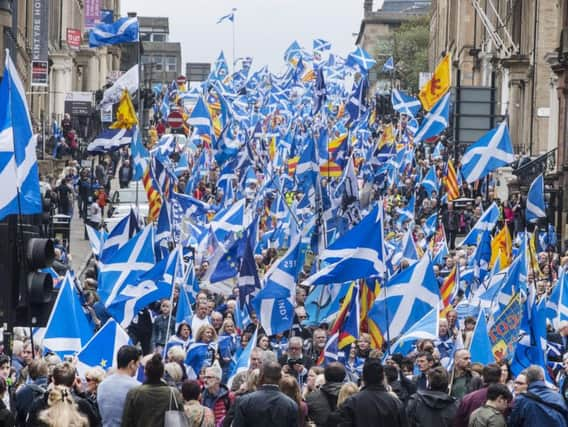Edinburgh Fringe 2019: Independence show dreams up Scottish citizenship test


That’s the first question that Kevin Gilday’s character will ask you when you sit down to watch Suffering from Scottishness, the Festival Fringe show/focus group in which Gilday and his audience agree the questions on a fictional Scottish citizenship test.
Fictional for now.
Borders, backstops and Brexit dominates conversation, as does a seemingly inevitable indyref2. What side are you on? Do you speak Scottish? Are you brave, or cowardly?
Where does the Fringe fit into this?
Advertisement
Hide AdThe Made in Scotland programme, funded by the Scottish Government to encourage cultural exports, has a wide range of Scottish shows this year - from a plethora of the usual Burns glut to the more cutting-edge works like Nicola McCartney’s ‘How Not To Drown’, the true story of Dritan Kasrati and his journey across Europe as a refugee to Britain.
August in Edinburgh spoils one for choice.
For a month some of the world’s best creatives are on our doorsteps and train platforms. We are lucky to have the Fringe held in Scotland, yet one can’t help but think - is the Fringe lucky to have Scotland?
How are Scots remembered or represented during Fringe time?
“Basically, I’ve made a show that both sides of the independence debate dislike,” Gilday says. “My character was once for it, but now thinks the movement has lost its way.”
How is such an overtly policised challenging of the debate received, performed in the heart of the Scottish capital?
“For the most part, people take it at face value," Gilday said. "Some don’t have a clue what I'm talking about.
“One woman hissed at me. I’ve seen on some Facebook forums people saying that I'm splitting the movement, that I’m a Unionist plant.
Advertisement
Hide Ad“A big part of the show is that the debate is tribal. People aren’t talking or listening anymore.
“I don’t think a lot of visitors realised that a nutcase group is taking over the narrative and making it a massive ‘us and them’ exclusive.
Advertisement
Hide Ad“It feels like the opposite of what they should be saying. How do you find a society, protect it, make it what it is? Not by telling everyone else to f**k off.”
What was it that made him think the best way to define Scottish identity would be to present it to a Fringe audience for the taking?
“I always wanted to write about my own split identity," he said.
"I grew up in an east end, Irish Catholic family in Glasgow, and I didn’t feel Scottish - even when I was a kid. I never felt Scotland was for me, even though I was Scottish.
“The 2014 referendum was the first time I thought ‘this is my time to have a say in what I want the country to be like’. That galvanised me a wee bit.
“I think it’s all gone to s**t since then. All that good will, enthusiasm, has turned into point scoring tribalism and it’s made me so angry and upset that I need to say something about it.
Advertisement
Hide AdWhat it means to identify as Scottish appears to be a recurring theme throughout Scottish theatre at the Fringe, where as Gilday says, it isn’t uncommon to be the only Scottish person in the room.
“I don’t want it to be a polemic rant about people - its a story that needs to be told in this way; the circumstances of coming to the stage and telling people ‘this is how we are looking at it’," he said.
Advertisement
Hide AdThere are different ways of looking at questions of Scottishness, just as there are different and numerous Scottish identities.
Elfie Picket’s ‘Ane City’ sees protagonist Tay return to Dundee on an alcohol soaked journey of self-discovery. Through Scots language, live music and storytelling, Tay grapples with what it truly means to be Scottish.
“We wanted to contemporise the traditional methods of Scottish storytelling” says writer Calum Kelly.
“It’s important to be keeping that style still relevant, and to be making Scottish work at the Fringe. It’s in Scotland, for one, and Scottish writing can get overlooked.
“Scots language can be misrepresented, too - or, at times, not represented within the Fringe at all.”
Representation is crucial to Ane City, with a big focus of the show being Tay’s working class background.
Advertisement
Hide Ad“Identifying as Scottish is definitely political and so is using the Scottish dialect, but so is being working class too,” says actress Taylor Dyson.
“The message of the play is Tay being comfortable with where she comes from. It’s about being a working-class artist and the anxiety of being young in a Scottish city.”
Advertisement
Hide AdWith the recent debate about where the Fringe fits within the current socio-political landscape in Scotland, these works are vital - not only for their questions, but also their answers.
Scottish identity has many different faces, of which not all are illustrated by the Fringe.
In August, Edinburgh doesn’t belong to the Scottish people, but the world. It is important that we hold onto these works so as to not lose sight of who and where Scotland is in the face of that.
